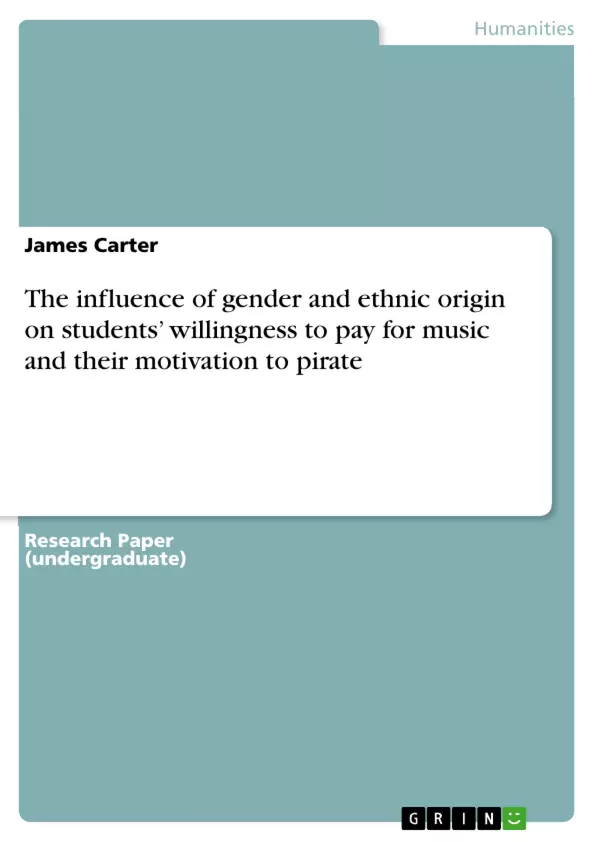The purpose of this study is to assess how gender and cultural norms determine student’s motivation and willingness to pay for or to pirate music. To reach a conclusion as to what sort of students engage in music piracy, a university wide survey was performed and students from the UK and international countries were surveyed.
There is a need for such a study as it will offer the music industry, marketers and educational institutions an insight into the motivations behind music piracy in university aged students and how their willingness to pay could be determined by their own cultural norms. This in turn could lead to strategies being created to combat music piracy in this age group and demographic and revenues in the music industry to increase.
This importance of this topic has recently been highlighted in the 2012 report from the Institute for Policy Innovation which found that music piracy brought about a loss of 71, 060 jobs in the US and an alleged $12. 5 billion loss to the American economy and many believe piracy to be the greatest threat facing the music industry worldwide. World sales of recorded music fell by 7% in value and by 8% in units in 2002 and it has been estimated that almost 40% of all the CDs and cassettes sold around the globe in 2001 were pirated copies.
While there are many negative impacts of piracy, other studies argue that from an economic and social standpoint piracy has ensured that more people can enjoy more music at a cheaper cost and has increase net consumer welfare, and that piracy ensures a continued interest and increased awareness or a wider range of music and thus benefiting the industry firms in the long term through increased revenue from concerts and festivals.
The Music industry, however, is strongly fighting individuals who either knowingly or unknowingly pirate copyrighted music. This is done in the belief that in prosecuting these individuals and making an example of them in the media, other potential music ‘pirates’ will be deterred. A lawsuit in 2004 where 532 university students were sued by the RIAA (Recording Industry Association of America) for illegal downloading, highlights the length the industry will go to to combat illegal music downloaders as well as the issues the industry believes they are facing from the young, online generation.
Inhaltsverzeichnis (Table of Contents)
- Introduction
- Literature Review
- Article critique
- Research question
- Population Sample
- Justification of qualitative methods
- Developing the research instrument
- Methodology of the pilot study
- Limitations of the Methodology
- Preliminary report based on our research
- Key findings
- Reflections on the appropriateness of our piloted design
- Appendix
- Bibliography
Zielsetzung und Themenschwerpunkte (Objectives and Key Themes)
This study investigates the influence of gender and cultural norms on student motivation and willingness to pay for or pirate music. It aims to provide insights into the motivations behind music piracy among university students, considering their cultural backgrounds. By analyzing these factors, the study hopes to contribute to strategies for combating music piracy and increasing revenue in the music industry.
- Influence of gender and cultural norms on music piracy
- Motivations behind music piracy among university students
- Impact of music piracy on the music industry
- Strategies for combating music piracy
- Economic and social implications of music piracy
Zusammenfassung der Kapitel (Chapter Summaries)
The introduction establishes the purpose and significance of the study, highlighting the economic impact of music piracy. It cites statistics on job losses and revenue decline caused by illegal downloads. The literature review analyzes previous research on music piracy, examining various factors influencing consumer behavior, including economic considerations, moral attitudes, and the role of artists. It explores the impact of piracy on the music industry and the effectiveness of different strategies for combating it.
The article critique focuses on a specific study examining consumer perceived risk related to music piracy, outlining the key factors influencing this perception.
Schlüsselwörter (Keywords)
This research centers around music piracy, exploring the key factors influencing consumer behavior, specifically gender, cultural norms, and student motivations. It delves into the economic impact of piracy on the music industry and potential strategies to address this issue. The study emphasizes the importance of understanding cultural variations in attitudes towards piracy and their implications for industry practices.
Frequently Asked Questions
How does gender influence music piracy?
Studies examine whether there are significant differences between male and female students regarding their motivation to download music illegally or their willingness to pay for it.
What role do cultural norms play in attitudes toward piracy?
The research suggests that a student's ethnic origin and cultural background can determine their perception of intellectual property and their likelihood to engage in piracy.
What is the economic impact of music piracy?
Piracy has led to significant job losses and billions of dollars in lost revenue for the American and global music economy, posing a major threat to the industry.
Are there any perceived social benefits to music piracy?
Some arguments suggest that piracy increases net consumer welfare by allowing more people to enjoy music at a lower cost and increasing awareness of a wider range of artists.
How has the music industry fought illegal downloading?
The industry, led by organizations like the RIAA, has used lawsuits against individuals, including university students, to deter potential pirates through public examples.
- Quote paper
- James Carter (Author), 2013, The influence of gender and ethnic origin on students’ willingness to pay for music and their motivation to pirate, Munich, GRIN Verlag, https://www.grin.com/document/230336



